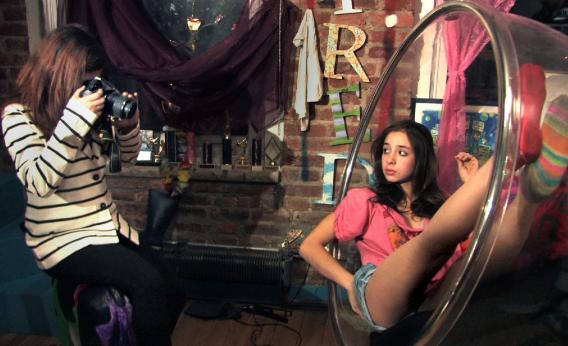What hath Internet porn wrought? Sexy Baby, a new documentary film about “sexiness in the cyber age,” investigates a new sexual landscape where “having pubic hair is considered unattractive,” most young people “know someone who has emailed or texted a naked photo of themselves,” and many kids “have accidentally or intentionally had their first introduction to sex be via hardcore online porn.” Directors Jill Bauer and Ronna Gradus follow three women to illustrate the tale: Nichole, a 32-year-old former porn actress looking to conceive; Laura, a 22-year-old kindergarten teacher seeking labiaplasty; and Winnifred, a 12-year-old navigating puberty, one “sexy” Facebook profile photo update at a time.
Each of these women is one decade deeper into our new sexting, status updating, fully-shaved sexual world. And yet, their sexualities don’t appear increasingly warped with each minute they spend online. Once Nichole and her husband Dave have a kid on the way, they worry that the adult industry they work in will start permeating their baby’s mind as soon as he’s old enough to crawl over to a computer. Dave says that the spread of online pornography has inspired kids to have sex younger and younger, but a quick Google search would reveal the truth: Kids are waiting longer to have sex than they did 20 years ago. In 1995, 19 percent of girls and 21 percent of boys had had sex before the age of 15. In 2008, 11 percent of girls and 14 percent of boys could say the same.
Representing that demographic is Winnifred, the youngest and most digitally savvy of the bunch. We watch her post endless self-shots to Facebook (she calls it “a beautiful place”), don heels and fishnets for a Lady Gaga concert, tell us that tweens today are expected to appear perpetually “down to fuck.” But we also see her tool around teen sex ed site Scarleteen and critically discuss her generation’s sexual expectations with her divorced New York City parents, who withdraw and reinstate her Facebook privileges depending on her social media behavior. At one point, Winnifred dons a beret and stages a feminist dramatic interpretation of the representation of “hos” in Soulja Boy’s song “Crank That.” “I think adults are intimidated by teenagers,” Winnifred, now 14, said in an interview after the film’s release. “But that’s because they don’t know how to deal with the new elements of adolescence. Most adults are uncomfortable engaging us in conversation.”
Stuck in the middle is Laura, the twentysomething set on modifying her perfectly normal genitalia to secure one of those “designer vaginas” we’re told are inspired by the unrealistic expectations of Internet porn. But Laura has absorbed this information second-hand. She used to laugh along as her male friends ridiculed a girl’s “beef curtains,” and only realized later that her own labia fit the description. When Laura drives to the surgeon, she uses directions printed out, on paper, from MapQuest. A few hours later, we see her bloody “excess” genitalia snipped and lying on the operating table.
The Internet perpetuates unrealistic sexual expectations for women, but it also offers escape routes for its own traps. Women who engage effectively online can find resources for critically assessing its most sexist tropes, join communities that don’t share those norms, and benefit from a kind of increased sexual mobility they can’t always find in real life.
This is a class issue: Winnifred is coping with the demands of modern sexuality from her tricked-out New York City bedroom, where the shelves are lined with Eve Ensler; Laura can’t imagine a life outside her North Carolina circle of friends, who specify the shape a woman’s vagina should be, so she saves up money to remove her labia instead. But Winnifred also benefits from a generational shift. The old Internet porn narrative of Laura’s generation—where boys consumed it, then exerted its lessons on their girlfriends—is obsolete. Girls like Winnifred are freer to explore their own desires online, too, and to talk about them with other women. This new online dynamic doesn’t totally upend the Internet’s sexual power dynamics between men and women, but at least it makes girls part of the discussion.
